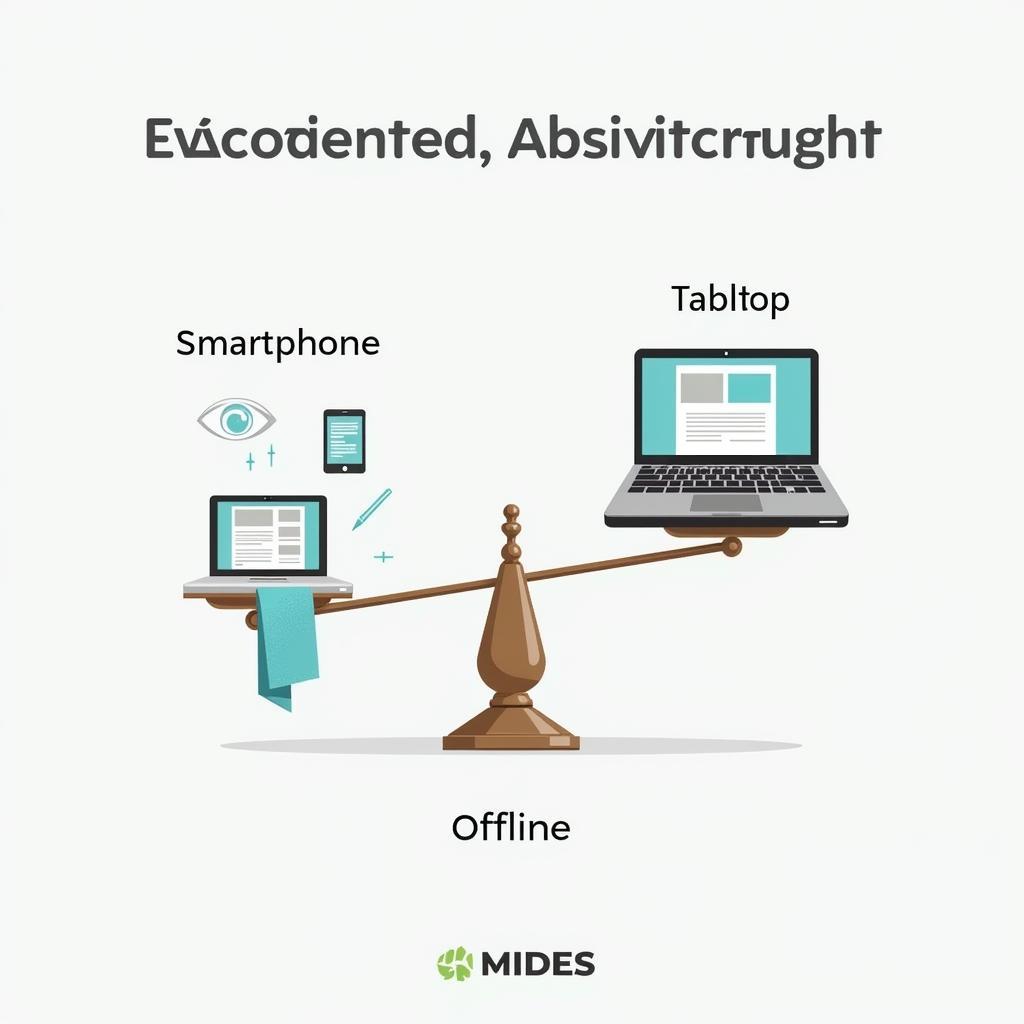In recent years, the topic of digital screen time has become increasingly prevalent in IELTS Writing Task 2 exams. Based on analysis of past exam questions and current trends, it’s highly likely that candidates will encounter tasks related to this subject in future tests. One such question that has appeared in previous exams and is likely to recur is:
Some people think there should be limits on the amount of time people spend using digital devices. Others believe people should be free to use digital devices as much as they want. Discuss both views and give your own opinion.
Let’s analyze this question and provide sample essays for different band scores to help you prepare effectively for your IELTS Writing Task 2.
Question Analysis
This question falls under the “discuss both views and give your opinion” category. It requires you to:
- Explain arguments for limiting digital device usage
- Present reasons against imposing such limits
- Provide your personal stance on the issue
The key aspects to address include:
- Potential benefits of limiting screen time
- Arguments for personal freedom in device usage
- Possible negative impacts of excessive screen time
- The role of personal responsibility vs. external regulation
Now, let’s look at sample essays for different band scores.
Sample Essay 1 (Band 8-9)
In today’s digital age, the debate over regulating screen time has gained significant traction. While some advocate for imposed limits on digital device usage, others argue for unrestricted access. This essay will examine both perspectives before presenting my own viewpoint.
Proponents of screen time limits argue that such restrictions can yield numerous benefits. Firstly, reduced digital consumption can lead to improved physical and mental health. Extended periods of screen use have been linked to various issues, including eye strain, poor posture, and disrupted sleep patterns. Moreover, limiting screen time can encourage individuals to engage in more diverse activities, fostering better social interactions and personal development. Additionally, for children and adolescents, regulated screen time can ensure a more balanced approach to education and leisure, potentially enhancing academic performance and creativity.
On the other hand, those opposing such limitations contend that personal freedom should be respected when it comes to digital device usage. They argue that individuals should have the autonomy to manage their own time and make informed decisions about their digital consumption. Furthermore, in an increasingly digital world, unrestricted access to technology is often viewed as essential for professional development and staying connected in both personal and work spheres. Advocates of this perspective also point out that digital devices offer valuable educational and entertainment resources, and limiting access could hinder learning opportunities and personal enjoyment.
Should parents limit screen time for children? In my opinion, while I acknowledge the importance of personal freedom, I believe that some form of guidance or limitation on screen time can be beneficial, especially for younger individuals. However, rather than imposing strict rules, I propose a balanced approach that combines education about responsible device usage with flexible guidelines. This strategy would empower individuals to make informed choices about their digital consumption while still providing a framework to prevent excessive use.
In conclusion, while both perspectives on screen time limits have merit, a nuanced approach that prioritizes education and self-regulation over strict limitations seems most appropriate. By fostering awareness and promoting responsible usage, we can harness the benefits of digital technology while mitigating its potential drawbacks.
(Word count: 349)
 IELTS Writing Task 2: Digital Screen Time Limits
IELTS Writing Task 2: Digital Screen Time Limits
Essay Analysis (Band 8-9)
This essay demonstrates excellent writing skills and would likely score in the Band 8-9 range. Here’s why:
-
Task Response: The essay fully addresses all parts of the task, discussing both views and clearly presenting the writer’s opinion.
-
Coherence and Cohesion: The essay is well-organized with clear paragraphing. Ideas are logically sequenced and effectively linked using a range of cohesive devices.
-
Lexical Resource: The vocabulary used is sophisticated and precise (e.g., “gained significant traction,” “fostering better social interactions,” “nuanced approach”).
-
Grammatical Range and Accuracy: The essay showcases a wide range of grammatical structures used accurately and appropriately.
-
Development of Ideas: Each point is well-developed with relevant examples and explanations.
Sample Essay 2 (Band 6-7)
Nowadays, many people are worried about how much time we spend on digital devices. Some think we should have limits, while others say we should be free to use them as much as we want. In this essay, I will discuss both sides and give my opinion.
Those who support limits on screen time have some good reasons. First, too much time on phones or computers can be bad for our health. It can hurt our eyes and make us sit in bad positions for too long. Also, when we spend less time on screens, we might do more outdoor activities or talk to people face-to-face, which is good for our social life. For children, limits on screen time can help them focus more on studying and playing with real toys.
On the other hand, people against these limits say we should be free to choose how we use our time. They think adults can decide for themselves how much time to spend on digital devices. Also, in today’s world, we need to use technology a lot for work and study. If we limit screen time too much, it might be hard to keep up with our jobs or education. Digital devices can also be useful for learning new things and entertainment.
How to tackle the issue of digital addiction is a complex question. In my opinion, I think some limits on screen time can be good, especially for children. However, I don’t think we need very strict rules for everyone. Instead, we should teach people how to use digital devices responsibly. This way, people can learn to balance their screen time with other activities on their own.
To conclude, while there are good arguments for both sides, I believe a mix of education and some flexible guidelines is the best way to deal with screen time. This can help people enjoy the benefits of technology without using it too much.
(Word count: 309)
 Balanced Approach to Digital Device Usage
Balanced Approach to Digital Device Usage
Essay Analysis (Band 6-7)
This essay demonstrates good writing skills and would likely score in the Band 6-7 range. Here’s why:
-
Task Response: The essay addresses all parts of the task, discussing both views and presenting the writer’s opinion.
-
Coherence and Cohesion: The essay is generally well-organized with clear paragraphing. Ideas are logically sequenced, though the use of cohesive devices is less sophisticated than in the Band 8-9 essay.
-
Lexical Resource: The vocabulary used is appropriate and adequate, though less varied and precise compared to the higher band essay.
-
Grammatical Range and Accuracy: The essay uses a mix of simple and complex sentence structures with generally good accuracy.
-
Development of Ideas: Each point is supported with relevant ideas, though the development is less thorough than in the Band 8-9 essay.
Key Vocabulary
-
Digital devices (noun) – /ˈdɪdʒɪtl dɪˈvaɪsɪz/ – Electronic equipment such as smartphones, tablets, or computers
-
Screen time (noun) – /skriːn taɪm/ – The amount of time spent using a device with a screen
-
Autonomy (noun) – /ɔːˈtɒnəmi/ – The right or condition of self-government
-
Mitigate (verb) – /ˈmɪtɪɡeɪt/ – To make less severe, serious, or painful
-
Nuanced (adjective) – /ˈnjuːɑːnst/ – Characterized by subtle shades of meaning or expression
-
Fostering (verb) – /ˈfɒstərɪŋ/ – Encouraging or promoting the development of something
-
Disrupted (adjective) – /dɪsˈrʌptɪd/ – Having been interrupted or disturbed
-
Hinder (verb) – /ˈhɪndə/ – To create difficulties for someone or something, making it slow or difficult
-
Prevalent (adjective) – /ˈprevələnt/ – Widespread in a particular area or at a particular time
-
Stance (noun) – /stæns/ – An attitude or position taken on an issue
Should children be limited in screen time? This question continues to be a topic of debate among parents, educators, and policymakers. As you prepare for your IELTS Writing Task 2, consider practicing with similar questions:
- Do the benefits of digital technology outweigh its drawbacks for young people?
- Should schools ban the use of smartphones during class hours?
- Is it the responsibility of parents or the government to regulate children’s internet use?
Remember, the key to success in IELTS Writing Task 2 is practice. Try writing your own essay on this topic and share it in the comments section below. This active practice will help you improve your writing skills and prepare you for success in your IELTS exam.


